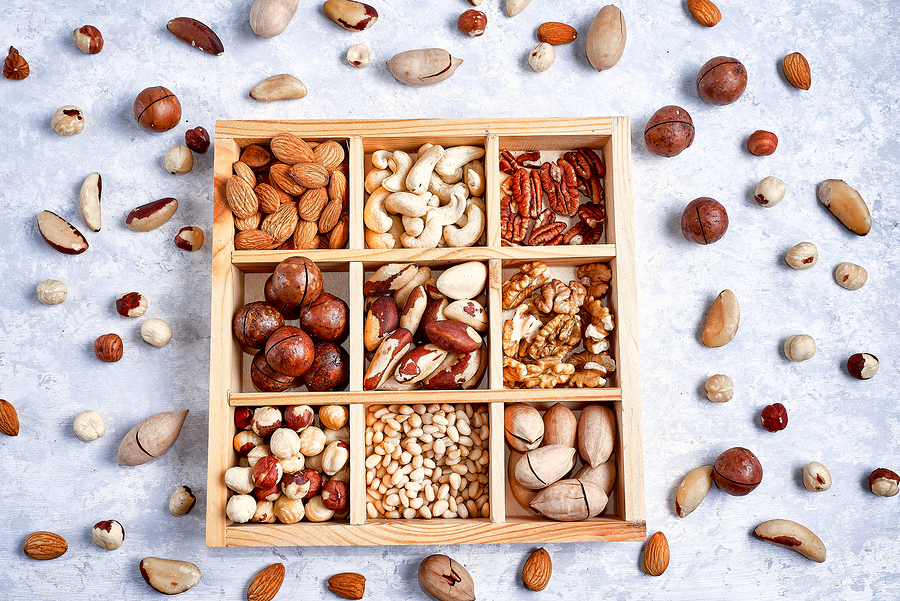'Go Nuts' for the Health Benefits of Tree Nuts
From breakfast to dinner to snacks, tree nuts are popular across the globe. They can be eaten whole (fresh or roasted), in spreads and butters, used as a source for gluten-free flour, and blended into smoothies or dessert recipes. Nut oils are used for cooking and are even found in skincare and haircare products.
But what is a nut? And what makes nuts so good for our health?
Tree nuts are dry fruits with one seed that becomes hard at maturity. With the exception of chestnuts, which have a different nutrient profile and higher level of starch, the most popular edible tree nuts are almonds, hazelnuts, walnuts, pistachios, and cashews. Other favorites include pecans, macadamia, and Brazil nuts. And then there's the peanut: even though it grows from the ground rather than on a tree and is technically a legume, its nutrient profile is considerably similar to tree nuts.
What Makes Nuts Good for Health?
Nuts are low in carbohydrates and high in vegetable protein, fiber, magnesium, antioxidants, vitamins, and minerals. They are low in saturated fat and a rich source of 'healthy' fats, mono- and polyunsaturated fatty acids (MUFAs and PUFAs).
Studies show that nuts
protect the heart, helping reduce risk for cardiovascular disease
support cellular defenses against free radicals that damage cells and are implicated in chronic disease
balance insulin levels, which relates to lower risk for Type 2 Diabetes
support healthy brain tissue
reduce inflammation
help maintain healthy cholesterol level
help maintain a healthy body weight
Epidemiological studies show regular consumption of nuts is linked to lower risk of all-cause mortality. High nut intake is associated with better overall cognition at older ages. In particular, walnuts are high in an essential fatty acid, named Omega-3 fatty acid, important to brain function. Pistachio nuts have been associated with significant gamma brain wave activity, critical for cognitive processing, memory, learning and perception. It's clear that tree nuts make an indispensable contribution to a well-balanced diet for omnivores and vegetarians alike. So, find a nut you love and make it part of your daily diet.
Resources
Kendall, CWC et al., "Health benefits of nuts in prevention and management of diabetes." Asia Pac J Clin Nutr (2010) 19:1, pp. 110-116. Accessed 31 March 2020: http://apjcn.nhri.org.tw/server/APJCN/19/1/110.pdf
O'Brien, J., et al. "Long-term intake of nuts in relation to cognitive function in older women." The journal of nutrition, health & aging (2014) 18,5 : 496-502. doi:10.1007/s12603-014-0014-6 Accessed 30 March 2020: https://www.ncbi.nlm.nih.gov/pmc/articles/PMC4105147/pdf/nihms596572.pdf
Berk, L., ELohman, E., Bains, G, et al., "Nuts and Brain Health: Nuts Increase EEG Power Spectral Density (μV&[sup2]) for Delta Frequency (1–3Hz) and Gamma Frequency (31–40 Hz) Associated with Deep Meditation, Empathy, Healing, as well as Neural Synchronization, Enhanced Cogn." FASEB, 2017 as cited at: https://www.sciencedaily.com/releases/2017/11/171115091809.htm
Ros, Emilio. "Health benefits of nut consumption." Nutrients vol. 2,7 (2010): 652-82. doi:10.3390/nu2070652 Accessed 31 Mar 2020: https://www.ncbi.nlm.nih.gov/pmc/articles/PMC3257681/pdf/nutrients-02-00652.pdf

